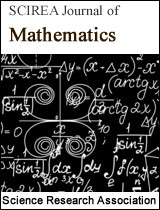Basic Nature of intermolecular attraction forces and Comparison with forces like Van Der Waals and hydrogen bonds by “Multi Molecule Theory”
DOI: 10.54647/mathematics11304 107 Downloads 15029 Views
Author(s)
Abstract
This is a fundamental result. What is the basic nature the intermolecular attraction forces? These questions were not thought off earlier. All the earlier conclusions were oriented towards finding the value of inter molecular attraction forces. We took the nature of these forces to be Newtonian Gravitation attraction forces between individual molecules vectorially added for the total set of molecules under consideration. This method can be applied to any molecule or chemical which is having all the three states of matter. For an example, for proving this concept, we tried to explain the three states of water. Due to these attraction forces between the molecules, some pairs of molecules come near to each other and hit and bounce like rubber balls. We tried to detect these inter molecular hits. We wrote macros in Visual Basic for Excel to find these hits that happened in an iteration. We plotted addresses of colliding molecules in a designated area in the worksheet. We got another new finding. This pattern of hits is changing with inter molecular distances, by changing all the inter molecular distances proportionally without changing the relative positions of molecules with each other. While checking with results this method with of states of water, we also will discuss about effect of Temperature. We will compare the effect of other forces like, Vander Waals (London dispersion forces) forces, hydrogen bonds, Keesom etc.. This method can explain Brownian motion etc.
Keywords
Gravitation, states of matter, hydrodynamics, molecular processes, molecular data, Multi Molecular Theory, SITA simulations, Dynamic Universe Model. Van Der Waals Forces, Singularity-free cosmology, Blue shifted Galaxies , Red shifted Galaxies, Grazing radiation frequency changes, Formation of Elements, Nucleosynthesis
Cite this paper
Satyavarapu Naga Parameswara Gupta,
Basic Nature of intermolecular attraction forces and Comparison with forces like Van Der Waals and hydrogen bonds by “Multi Molecule Theory”
, SCIREA Journal of Mathematics.
Volume 7, Issue 1, February 2022 | PP. 1-29.
10.54647/mathematics11304
References
| [ 1 ] | Purcell C: Life at low Reynolds number. Am J Phys 1977, 45:3-11. |
| [ 2 ] | Daniel Riveline ’Single molecule’: theory and experiments, an introduction From Nanophysics for Health , Journal Of Nanobiotechnology, Mittelwhir, France. 5-9 November 2012Riveline Journal of Nanobiotechnology 2013, 11(Suppl 1):S1 http://www.jnanobiotechnology.com/content/11/S1/S1 Correspondence: riveline@unistra.fr [7]2. Purcell C: Life at low Reynolds number. Am J Phys 1977, 45:3-11. 6. Schuler B, Eaton WA: Protein folding studied by single-molecule FRET. Curr Opin Structl Biol 2008, 18(1):16-26. |
| [ 3 ] | Papai G, Weil PA, Schultz P: New insights into the function of transcription factor TFIID from recent structural studies. Curr Opin Genet Dev 2011, 21(2):219-224. |
| [ 4 ] | Meglio A, Praly E, Ding F, Allemand J-F, Bensimon D, Croquette V: Single DNA/protein studies with magnetic traps. Curr Opin Struct Biol 2009, 19(5):615-622. |
| [ 5 ] | Alder, B. J.; Wainwright, T. E. (August 1959). "Studies in Molecular Dynamics. I. General Method". The Journal of Chemical Physics. 31 (2): 459–466. Bibcode:1959JChPh..31..459A. doi:10.1063/1.1730376. |
| [ 6 ] | Rahman, A. (19 October 1964). "Correlations in the Motion of Atoms in Liquid Argon". Physical Review. 136 (2A): A405–A411. Bibcode:1964PhRv..136..405R. doi:10.1103/PhysRev.136.A405. |
| [ 7 ] | Garrett, Reginald H.; Grisham, Charles M. (2016). Biochemistry (6th ed.). University of Virginia. pp. 12–13. |
| [ 8 ] | Tschumper, Gregory S. (20 October 2008). "Reliable Electronic Structure Computations for Weak Noncovalent Interactions in Clusters". In Lipkowitz, Kenny B.; Cundari, Thomas R. (eds.). Reviews in Computational Chemistry. 26. John Wiley & Sons. pp. 39–90. doi:10.1002/9780470399545.ch2 (https://doi.org/10.100 2%2F9780470399545.ch2). ISBN 9780470399545. |
| [ 9 ] | Chemical Bonding Ms Shethi and M. Satake |
| [ 10 ] | https://en.wikipedia.org/w/index.php?title=Van_der_Waals_force&oldid=958850259 This page was last edited on 26 May 2020, at 00:57 (UTC). |
| [ 11 ] | H. C. Hamaker, Physica, 4(10), 1058–1072 (1937) |
| [ 12 ] | F. London, Transactions of the Faraday Society, 33, 8–26 (1937) |
| [ 13 ] | R. Tadmor (March 2001). "The London-van der Waals interaction energy between objects of various geometries". Journal of Physics: Condensed Matter. 13 (9): L195–L202. Bibcode:2001JPCM...13L.195T (https://ui.adsabs.harvard.edu/abs/2 001JPCM...13L.195T). doi:10.1088/0953-8984/13/9/101 (https://doi.org/10.1088%2F0953-8984%2F13%2F9%2F101) |
| [ 14 ] | Israelachvili J. (1985–2004). Intermolecular and Surface Forces. Academic Press. ISBN 978-0-12-375181-2. |
| [ 15 ] | V. A. Parsegian (2006). van der Waals Forces: A Handbook for Biologists, Chemists, Engineers, and Physicists. Cambridge University Press. ISBN 978-0-521-83906-8. |
| [ 16 ] | S.N.P.GUPTA, Dynamic Universe Model: A singularity-free N-body problem solution, VDM Publications, Saarbrucken, Germany (2010) |
| [ 17 ] | S.N.P.GUPTA, Dynamic Universe Model: SITA singularity free software, VDM Publications, Saarbrucken, Germany ( 2011) |
| [ 18 ] | S.N.P.GUPTA, Dynamic Universe Model: SITA software simplified VDM Publications, Saarbrucken, Germany (2011) |
| [ 19 ] | S.N.P.GUPTA, ‘Dynamic Universe Model Predicts the Live Trajectory of New Horizons Satellite Going To Pluto’ Applied Physics Research, 7(4), pp. 63-77 (2015) |
| [ 20 ] | J. V. Narlikar, ‘Introduction to cosmology’, Foundation books, New Delhi , India (1983) |
| [ 21 ] | S.N.P.GUPTA, ”Dynamic Universe Model Explains the Variations of Gravitational Deflection Observations of Very-Long-Baseline Interferometry” Applied Physics Research, 6(4), pp.1-16, (2014) https://en.wikipedia.org/w/index.php?title=Van_der_Waals_force&oldid=958850259 This page was last edited on 26 May 2020, at 00:57 (UTC). |

